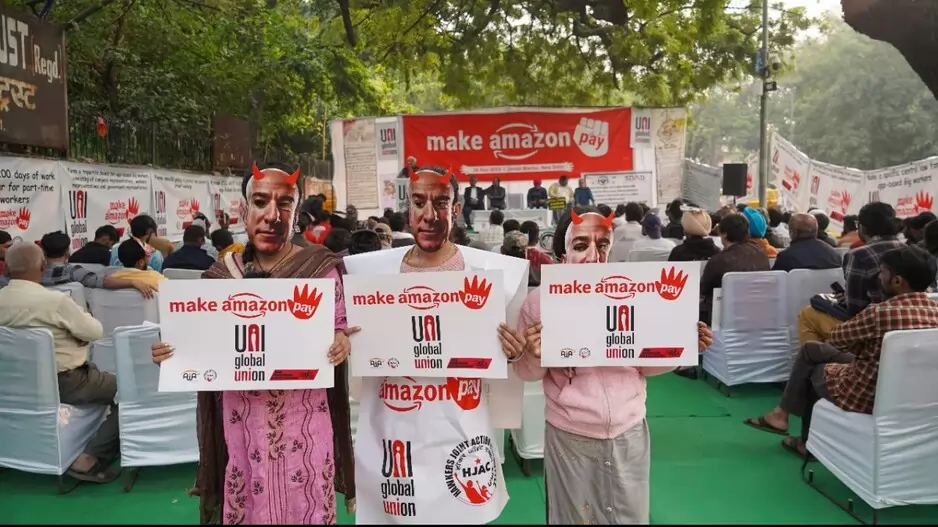
The National Human Rights Commission (NHRC) has noticed media reports about the harsh working conditions of workers at Amazon warehouses.
The NHRC acted independently after learning that Amazon employees at the warehouse in Manesar, Haryana, were reportedly made to promise not to take toilet or water breaks during the scorching weather in May 2024.
Workers at the Manesar warehouse have been in the news lately. They have complained about insufficient water and toilets and feeling pressured to meet packaging targets.
Some of the other issues raised by the workers include working in extreme heat, being unable to take breaks, low wages, lack of health protection, and the threat of losing their jobs if they take a break.
In India, Amazon has around 50 warehouses spread across 16 states, with at least 6-7 in the Delhi-NCR region.
The NHRC stated that if the reported incidents from various media organisations are valid, it raises serious concerns about violating workers’ rights according to labour laws and guidelines issued by the Union Ministry of Labour and Employment.
It’s important to note that the multinational e-commerce company Amazon has invested over US $6.5 billion in India. Among the many warehouses owned by multinational companies in India, the one in Manesar, Haryana, is operated by Amazon.
The Amazon India Workers Association (AIWA) reports that 50-60 per cent of workers in Amazon warehouses across India are women. These workers face challenges such as inadequate breaks and unachievable targets.

RELATED: Why is child marriage still prevalent in India despite efforts to combat it?
Workers Struggle: Not Enough Breaks and Must Meet Impossible Targets
Rupa Kumari (name changed) works in a warehouse in Manesar, Uttar Pradesh. Her work involves packing 150 items in one hour.
Any mistakes or time spent moving between departments are tracked. After three mistakes, workers cannot work in any Amazon warehouse nationwide.
Rupa earns a monthly salary of Rs 10,088 and can earn an incentive of Rs 3250 if she does not take any leave. She works part-time as an “alpha worker” and earns Rs 614 daily.
Amazon faces accusations of making employees work 10-hour shifts without breaks, chairs, or water access. Many workers in Amazon’s Indian warehouses, where a significant portion are women, complain of being forced to meet unattainable goals without adequate breaks.
The National Human Rights Commission (NHRC) has taken an interest in these claims, especially after reports about employees at the Manesar, Haryana warehouse being told not to take toilet or water breaks during hot weather.
Workers have reported extreme heat, insufficient breaks, low pay, and a lack of health protections.

Amazon, which has invested over $6.5 billion in India and has about 50 warehouses nationwide, is under scrutiny for possibly violating labour laws.
Workers like Rupa Kumari and Pawan Kumar (names changed) share their struggles with meeting demanding targets and their harsh working conditions, highlighting the concern over whether labour laws are being followed in these scenarios.
The Manesar warehouse has about 1500 employees who work in shifts. An issue at the warehouse is the need for proper ventilation and cooling. According to the workers, they receive only a few minutes of first aid and Dolo tablets in case of an accident.
Pawan Kumar, an Amazon’s Manesar warehouse worker, mentioned that the work involves unloading items, and the pressure makes it difficult to take breaks, causing stomach pain.
Even using the restroom during lunch break is challenging. The workers have 10-hour shifts standing and often walk long distances, ranging from 5-7 kilometres to 20-25 kilometres in other departments.
RELATED: Why Nitish Kumar’s Comments on Women Reflect a Larger Societal Issue
Are the Labour Laws being Followed?
In India, most people work in the unorganised sector, where 83 per cent of the workforce is employed. The remaining 17 per cent work in the organised sector.
Over 90 per cent of all workers in the economy are informal, meaning they don’t have a written contract, paid leave, or other benefits. Even in the organised sector, 9.8 per cent of workers are informal, which shows how common outsourcing is.
Informal workers don’t have a written contract, paid leave, health benefits, or social security.
Kumar believes that the company has long-standing issues with work conditions, low pay, and long hours.
Although the company is part of the Employees State Insurance Corporation and Employees Provident Fund, it hires workers through third-party vendors, leaving the responsibility to the vendor.
The company pays minimum wages and violates the Factory Act by making employees work more than 48 hours per week without proper overtime compensation. Job security is also a concern for the workers.
In our country, many people work in the unorganised sector. While working for big companies may seem attractive, workers face challenges in Amazon’s warehouses.
Ravi Kumar (name changed), who works at the Manesar warehouse in Uttar Pradesh, expressed concerns about the working conditions.
He mentioned that although Amazon provides health facilities through the Employees State Insurance Corporation, there is a delay in receiving these benefits after the appointment.
The warehouses have tin roofs, which makes them very hot, primarily due to the lack of fans. Furthermore, workers are not allowed to sit or use the toilet during work, and raising these issues can lead to being put on a blacklist or pressured to resign.
Protective equipment is vital for workers in warehouses. Ravi mentioned that workers in the dock are provided with bright-coloured jackets and gloves.
Once, Ravi’s finger got stuck in the conveyor belt while unloading, causing bleeding. However, the medical support only provided him with pain relievers and an oral rehydration solution (ORS).
Unfortunately, there are no arrangements for accidents on-site. The nearest hospital from the warehouse in Manesar is 20 km away, and the one where workers can receive treatment under the Employee State Insurance Corporation (ESIC) is 25 km away.

What did Amazon Say about the Issue?
The company issued a statement regarding the issue. According to the statement, the company is investigating the claims.
However, the company emphasised that such requests are not a part of their standard business practice and would take immediate action to stop any alleged incidents.
The safety and well-being of their employees and associates are their top priorities. The company assured us that their fulfilment centres are designed to provide a safe and comfortable working environment with industry-leading infrastructure and facilities.
They monitor heat levels in their buildings, especially during the summer, and take measures such as suspending work if the heat becomes too intense. Additionally, they have cooling measures in place, including ventilation systems, fans, and spot coolers.
Employees are provided with water, hydration, and regular rest breaks in more relaxed environments, with additional breaks when temperatures are high. The employees are also encouraged to take informal breaks for restroom visits, get water, or speak to a manager or HR.
Earlier, AIWA asked the Ministry of Labour and Employment to keep warehouse workers safe. They also asked the National Disaster Management Authority to protect workers from extreme heat.
In 2018, the International Labour Organisation reported that 82 per cent of working women in the country are in the informal sector.
The e-Shram national database from March 22 shows that more women than men work in the unorganised sector. Women make up over 52 per cent of the 287 million unorganised workers in the country.
Employees have said that their health at work is essential for people working in extreme heat. According to the Factories Act of 1948, all employers have to ensure that workers who do unorganised work have somewhere to sit if they need it.
But these workers don’t choose to work in these places – they have to. The government needs to find a long-term solution for people working in the unorganised and informal sectors of the country.






Not protected by osha if you are not on the us, need to take that issue up with the countries they operate in